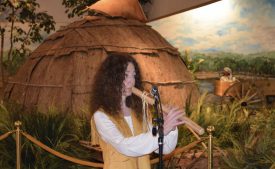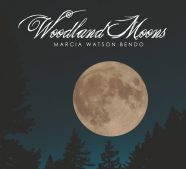
“I play with emotion, and I do sense the person who is supposedly speaking through this song, their pain or their emotion, and it is very touching,” said Native American flutist and professional musician Marcia Bendo.
In addition to her doctorate in psychology and a law degree, she performed as a violinist with the Tulsa Philharmonic for a decade beginning at age 19. She shared the stage with Doc Severinsen, Sammy Davis Jr., Roy Clark, Chet Atkins, Ella Fitzgerald, Tom Jones and Tammy Wynette through the symphony’s Pops Series of concerts and her work as a freelance violinist.
Despite those experiences, the flute holds a special place in her heart, both musically and as a part of a bigger culture. Bendo is a Citizen Potawatomi Nation member and a descendent of the Bertrand family. Her grandfather enrolled her when she was 10 years old.
“As these memories and emotions come out in the music, you’ll think about your heritage. You’ll think about your ancestors,” she said. “It may make it more alive for some people. It’s just the emotional connection.”
Violin to flute
Bendo attended Tulsa International Mayfest in 1987, where she discovered musical duo Coyote Oldman. She purchased a flute and a cassette tape of their recordings from Michael Graham Allen, a member of the group who played an influential role in introducing Native American flute music into pop culture.
“I was just quite enthralled with the sound. Back in those days, you didn’t hear them very often, and it was a very haunting, melodic, beautiful sound,” Bendo said. “I didn’t know much about it, and it sat on my coffee table the whole time I was working on my Ph.D. in psychology.”
Finally, in 2011, she learned to play. Shortly after beginning private lessons and attending workshops, it became natural for her. She also researched the history of the instrument and attempted to find traditional Potawatomi flute pieces with little luck.
“Even though you’re playing an instrument, a rattle or a drum, or a song with your voice, it’s an oral tradition,” she explained. “There’s nothing written down and most likely nothing recorded either.”
Playing as a Potawatomi
Bendo performed at the 2016 Gathering of Potawatomi Nations and 2013 National Congress of American Indian Annual Convention & Marketplace. She has also exhibited her skills at every CPN Family Reunion Festival since 2012. During the annual event, she demonstrates her techniques.
“What I’ve done for my presentations at the Cultural Heritage Center is to make a collection of songs from many different tribes; a diverse collection that I usually play and explain, ‘This is from this tribe or nation,’” she said. “Many of them are very emotional songs. They’re women’s songs about their warriors going off to war, or they are songs about losing a love or finding a love, or songs about their children, lullabies.”
She now composes, too, and the writing process strengthens her connection with her Potawatomi culture and ancestors.
“Someone said to me once, ‘Well, Marcia, don’t worry about not being able to find any Potawatomi flute songs. You are Potawatomi. Anything you play is a Potawatomi song,’” she said. “That’s how I’m looking at it now. It may not be a traditional song that was sung or played 100 years ago, but they are songs from my heart.”
New album
Over the last two years, Bendo compiled an album of originals titled Woodland Moons. The 12 tracks represent each full moon throughout the year, and she utilized the traditional Potawatomi moon names for titles.
In Potawatomi culture, the moons signify the time of year through agriculture, animals, weather patterns and more. For example, June’s moon is De’mengises, or Strawberry Moon, named for the time of the bountiful berry harvest. November is Bnakwigises, or Fallen Leaves Moon, for the autumnal changing of foliage.
Attending a women’s full moon ceremony a couple of years ago inspired Bendo to research them. The spiritual experience piqued her interest about how Potawatomi of the past lived.

“I learned a lot about of the work activities and how hard they had to work. The sugarbush — they worked so hard getting sugar, the things that we take for granted,” she said. “It made it more real to me what my ancestors may have gone through.
“I often write pieces of music when I’m feeling emotional about something.”
While moved by subject matter hundreds of years in the making, Bendo’s album puts a twist on the characteristics associated with Native American music, fusing her musical background as an orchestra violinist with her skills as a flutist.
“If I was going to describe my music, this album, it’s not traditional in the sense that it’s not ceremonial music,” she said.
“It’s contemporary, and I would describe it as cinematic. It’s just a compilation of all the styles that I know and love.”
Read more and listen to the album at marciabendowatson.com.
